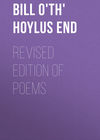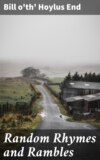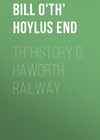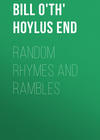Loe raamatut: «Revised Edition of Poems»
PREFACE
The Author respectfully submits to the general public of his native town and district, this volume of poems, containing some of the chief results of his musings for the past thirty years. He hopes that the volume, which is in reality the production of a life-time, will in many ways be deemed worthy of the kind and courteous approbation of his numerous patrons and friends, as well as the indulgence of literary critics.
In launching forth the work, the Author begs to tender to his patrons and the public generally, his most sincere and hearty thanks for the assistance they have ever rendered him so as to enable him to acquire the necessary leisure for the cultivation of his muse. The result now achieved is not the comprehensive collection of the efforts of the author, but it may he taken as a selection and a representation of his more generally interesting productions from time to time.
Various reasons have operated in the time of the publication and the curtailment of this volume; but it is now submitted with every respect to the public for their perusal. Many of his poems, which are not found in the present volume, the author trusts will be deemed worthy of being treasured in the scrap books of his friends. Of the literary merits of the composition, it would ill become the author in any way to descant upon; but in regard to these he leaves himself entirely and absolutely in the hands of a critical, and, he hopes, an indulgent public, feeling assured that he may trust himself in the hands of his readers.
No formal dedication is here made to any particular patron, but the book is submitted without the powerful influence of any conspicuous name or the commendation of any well-known literary friend; and like Dr. Johnson of old, failing patrons, he trusts that his work will, in the midst of his numerous competitors, locally and generally, be thought worthy of the attention of the various classes of the public.
AUGUST, 1891.
The Grand Old Man of Oakworth
Come, hand me down that rustic harp,
From off that rugged wall,
For I must sing another song
To suit the Muse’s call,
For she is bent to sing a pœan,
On this eventful year,
In praise of the philanthropist
Whom all his friends hold dear —
The Grand Old Man of Oakworth,
Beyond his eightieth year!
No flattery! My honest Muse,
Nor yet be thou servile;
But tinkle up that harp again,
A moment to beguile.
Altho’ the bard be rude and rough,
Yet, he is ever proud
To do the mite that he can do,
And thus proclaim aloud —
The Grand Old Man of Oakworth,
Of whom we all are proud!
For base indeed were any bard
That ever sang on earth,
Did he not wish his neighbour well,
And praise his sterling worth.
Leave state affairs and office
To those of younger blood,
But I am with the patriot,
The noble, wise, and good —
The Grand Old Man of Oakworth,
The wise, the great, the good!
This worthy old philanthropist,
Whom all his neighbours greet;
Who has a smile for every one
Whom he may chance to meet —
Go to yon pleasant village,
On the margin of the moor,
And you will hear his praises sung
By all the aged poor —
The Grand Old Man of Oakworth,
A friend unto the poor!
Long may he live! and happy be,
The patriot and the sire;
And may some other harp give praise,
Whose notes will sound much higher.
His thirst for knowledge, worth, and lore —
His heart was ever there —
This worthy old philanthropist,
Beyond his eightieth year! —
The Grand Old Man of Oakworth,
Beyond his eightieth year.
THOUGHTS SUGGESTED ON HEARING
Dr. Dobie’s Lecture on Burns
Though murky are the days and short,
And man he finds but little sport,
These gloomy days, to cheer him;
Yet, if a Dobie should, perchance,
Come out before an audience,
’Tis worth our while to hear him.
Right pleased was I, dear sir, to hear
Your lecture on that subject dear,
So grand and superhuman;
For all the world doth pay regard
To Bobbie Burns, the Scottish bard,
The patriot and the ploughman.
Your words, indeed, were passing good,
On him who kenned and understood
The kirk and all its ranting;
Who “held the mirror” up, indeed,
To show the “muckle unco-guid”
Their double-dyéd canting.
You painted him sometimes in glee
While other times in poverty —
To gold without alliance;
Yet, after all he kept his pace,
And looked grim fortune in the face,
And set him at defiance.
But, alas! the picture, was it true?
Of Burns’ parents, poor and low —
So furrowed and so hoary —
It makes our very hearts to burn
To think that “man was made to mourn,”
And tell the sad, sad story.
You brought me back to days bygone,
When glad its banks I strolled upon,
The river Doon so bonnie;
The roofless kirk and yard so green,
Where many a tombstone may be seen,
With Tam and Souter Johnnie.
And when ye spake of yond bright star
That lingers in the lift afar,
Where Burns was never weary
Of gazing on the far-off sphere,
Where dwells his angel lassie dear —
His ain sweet Highland Mary!
But here my Muse its wings may lower;
Such flights are far beyond its power;
So I will stop the jingle.
Sir, I am much obliged to you,
And I am much indebted to
The Choir and Mr. Pringle.
What Profits Me
What profits me tho’ I sud be
The lord o’ yonder castle gay;
Hev rooms in state to imitate
The princely splendour of the day
For what are all my carvéd doors,
My chandeliers or carpet floors,
No art could save me from the grave.
What profits me tho’ I sud be
Decked i’ costly costumes grand,
Like the Persian king o’ kings,
Wi’ diamond rings to deck my hand:
For what wor all my grand attire,
That fooils both envy and admire,
No gems could save me from the grave.
What profits me tho’ I sud be
Thy worthy host, O millionaire,
Hev cent. for cent. for money lent;
My wealth increasing ivvery year.
For what wor all my wealth to me,
Compared to immortality,
Wealth could not save me from the grave.
What profits me tho’ I sud be
Even the gert Persian Shah,
My subjects stand at my command,
Wi’ fearful aspect and wi’ awe;
For what wor a despotic rule,
Wi’ all the world at my control,
All could not save me from the grave.
The Death of Gordon
From the red fields of gore, ’midst war’s dreadful clang,
I hear a sad strain o’er oceans afar:
Oh, shame, shame upon you, ye proud men of England,
Whose highest ambition is rapine and war!
Through your vain wickedness
Thousands are fatherless,
False your pretensions old Egypt to save;
Arabs with spear in hand
Far in a distant land
Made our brave Gordon a sad and red grave.
On Nile’s sunny banks, with the Arab’s great nation,
Brave Gordon was honoured and worshipped by all,
The acknowledged master of the great situation,
Until England’s bondholders caused Egypt to fall.
Another great blunder,
Makes the world wonder,
Where is Britannia’s sword, sceptre and shield?
War and disaster
Come thicker and faster,
Oh, for the days of the Great Beaconsfield!
Oh, Great Beaconsfield! the wise and the clever,
When will thy place in our nation be filled?
Britannia’s shrill answer is never, oh never,
My Beaconsfield’s dead, and my Gordon is killed!
Oh, blame not my foemen
Or a Brutus-like Roman,
Or Soudanese Arabs for Gordon’s sad doom;
But blame that vain Briton
Whose name is true written,
The slayer of Gordon, who fell at Khartoum.
The Earl of Beaconsfield
I sing no song of superstition,
No dark deeds of an Inquisition,
No mad-brain’d theme of wild ambition,
For lo, their doom is sealed!
But I will use my best endeavour,
To praise the good, the wise, the clever,
Who will remember’d be for ever,
The Earl of Beaconsfield.
When England was without alliance,
He bid the Russians bold defiance,
On Austria had no reliance
In either flood or field;
He proudly sent to Hornby message,
The Dardanelles! go force the passage
In spite of Turkey, Bear, or Sausage,
The dauntless Beaconsfield!
At Berlin, he with admiration
Was gazed upon by every nation,
And, master of the situation,
Vow’d Britons ne’er would yield.
For I am here, you may depend on’t,
This Eastern brawl to make an end on’t,
To show both plaintiff and defendant
I’m Earl of Beaconsfield!
Britannia now doth weep and ponder,
Bereaved of him, her child of wonder,
No earthly power could break asunder
His love for England’s weal.
And now those locks once dark as raven
(For laurel leaves ne’er deck’d a craven)
Wear a laurel crown in Heaven,
Glorious Beaconsfield!
Come, Nivver Dee i’ Thi Shell
“Come, nivver dee i’ thi shell, owd lad,”
Are words but rudely said;
Though they may cheer some stricken heart,
Or raise some wretched head;
For they are words I love mysel,
They’re music to my ear;
They muster up fresh energy
An’ chase each doubt an’ fear.
Nivver dee i’ thi shell, owd lad,
Though tha be poor indeed;
Ner lippen ta long i’ th’ turnin’ up
Sa mich ov a friend in need;
Fur few ther are, an’ far between,
That help a poor man thru;
An’ God helps them at help therseln,
An’ they hev friends enew.
Nivver dee i’ thi shell, owd lad,
Whativver thi creditors say;
Tell um at least tha’rt foarst ta owe,
If tha artant able ta pay;
An’ if they nail thi bits o’ traps,
An’ sell tha dish an’ spooin;
Remember fickle forten lad,
Shoo changes like the mooin.
Nivver dee i’ thi shell, owd lad,
Though some may laugh an’ scorn;
There wor nivver a neet afore ta neet,
Bud what ther’ com a morn;
An’ if blind forten used tha bad,
Sho’s happen noan so meean;
Ta morn al come, an’ then fer some
The sun will shine ageean.
Nivver dee i’ thi shell, owd lad,
Bud let thi motto be, —
“Onward!” an’ “Excelsior;”
An’ try for t’ top o’t’ tree:
An’ if thi enemies still pursue,
Which ten-ta-one they will,
Show um owd lad, tha’rt doin’ weel,
An’ climin’ up the hill.
Owd Betty’s Advice
So Mary, lass, tha’rt bahn to wed
It mornin’, we young Blacksmith Ned,
An’ though it maks thi mother sad,
It’s like to be;
I’ve nowt ageean yond dacent lad,
No more ner thee.
Bud let me tell tha what ta due,
For my advise might help tha thru;
Be kind, and to thi husband true,
An’ I’ll be bun
Tha’ll nivver hev a day ta rue
For owt that’s done.
Nah, try to keep thi former knack,
An’ du thi weshin’ in a crack,
Bud don’t be flaid to bend thi back,
Tha’ll nobbut sweeat;
So try an’ hev a bit o’ tack,
An’ du it neeat.
Be sure tha keeps fra bein’ a flirt,
An’ pride thysel i’ bein’ alert, —
An’ mind ta mend thi husband’s shirt,
An’ keep it cleean;
It wod thi poor owd mother hurt,
If tha wur meean.
Don’t kal abaht like monny a wun,
Then hev to broil, an’ sweeat, an’ run;
Bud alus hev thi dinner done
Withaht a mooild;
If it’s nobbut meil, lass, set it on,
An’ hev it boiled.
Now Mary, I’ve no more ta say —
Tha gets thi choice an’ tak thi way;
An’ if tha leets to rue, I pray,
Don’t blame thi mother:
I wish yeh monny a happy day
Wi wun another.
T’owd Blacksmith’s Advice ta hiz Son Ned
So, Ned, awm geen ta understand,
Tha’rt bahn ta join i’ wedlock band,
Ta travil thru life’s weeary strand,
Yond lass an’ thee;
But if yer joinin’ heart an’ hand,
It pleases me.
Nah tha’ll hev trubbles, Ned, ta bear,
While pushin’ thru this world o’ care,
An’ wat tha’ll hev it face ta stare,
It’s hard ta tell;
Life’s ups and dahns tha’ll get ta share,
So pleas thisel’.
Tha’rt weel an’ strong, long may it last;
But age an’ care creep on us fast;
Then act az tha can luke at t’past
An’ feel no shaam;
Then if tha’rt poor az sum ahtcast,
Tha’rt noan ta blame.
Doant sport abaht an’ wagers bet,
But mind an’ shun that foolish set
At cannut mak ther awn ta fet,
Though shaam to say it.
An’ mind tha keeps fra bein’ i’ debt,
An’ tha’ll be reight.
Nah stick fast hod o’ iron will;
Push boldly on an’ feear no ill;
Keep Him i’ veiw, whoa’s mercies fill
The wurld sa wide.
No daht but His omnishent skill
Al be thi guide.
So Ned, mi lad, tak this advice,
Prove worthy o’ yond lass’s choice,
I’ years ta cum tha may rejoice
Tha tuke her hand;
An’ listened ta thi father’s voice,
An’ his command.
Th’ Furst Pair o’ Briches
Aw remember the days o’ mi bell-button jacket,
Wi’ its little lappels hangin’ down ower mi waist,
An’ mi grand bellosed cap, – noan nicer I’ll back it, —
Fer her at hed bowt it wur noan withaht taste;
Fer shoo wur mi mother an’ I wur her darling,
An often shoo vowed it, an’ stroked dahn mi hair,
An’ shoo tuke ma to see her relashuns i’ Harden
It furst Pair o’ Briches at ivver aw ware.
Aw remember the time when Aunt Betty an’ Alice
Sent fer me up to lewk at mi cloas,
An aw wauked up as prahd as a Frenchman fra Calais,
Wi’ mi tassel at t’side – i’ mi jacket a rose.
Aw sooin saw mi uncles, both Johnny an’ Willy,
They both gav me pennies, an’ off aw did steer:
But aw heeard um say this, “He’s a fine lad is Billy,”
It furst Pair o’ Briches at ivver aw ware.
Aw remember t’ time at ahr Robin and Johnny
Wur keeping their hens an’ ducks i’ t’ yard,
Tha wur gamecocks an’ bantams, wi’ toppins so bonny,
An’ noan on um mine – aw thowt it wur hard.
But aw saved up mi pennies aw gat fer mail pickin’,
An’ sooin gat a shilling by saving it fair,
Aw then became maister at least o’ wun chicken,
It furst Pair o’ Briches at ivver aw ware.
Aw remember wun Sabbath, an’ t’sun it wor shining,
Aw went wi’ mi father ta Hainworth ta sing;
An’ t’stage wur hung raand wi’ bottle-green lining;
And childer i’ white made t’ village ta ring.
We went ta owd Meshach’s that day ta wur drinkin’,
Though poor, tha wur plenty, an’ summat ta spare;
Says Meshach, “That lad, Jim, is just thee, aw’m thinking,
It furst Pair o’ Briches at ivver tha ware.”
Now them wur the days o’ grim boggards and witches,
When Will-o’-the-wisp cud be seen in the swamp,
But nah are the days o’ cheating fer riches,
An’ a poor honest man is classed wi’ a scamp.
Yes, them wur the days at mi mind worrant weary;
O them wur the days aw knew no despair;
O give me the time o’ the boggard an’ fairy,
Wi’ t’ furst Pair o’ Briches at ivver aw ware.
Ah! them wur the days aw sall allus remember,
Sud aw just as owd as Mathusalah last;
Them wur mi March days, but nah it’s September:
Ne’er to return again – them days are past.
But a time aw remember aboon onny other,
Aw kneeled o’ mi knees an’ sed the Lord’s Prayer;
Aw sed “God bless mi father, an’ God bless mi mother,”
It furst Pair o’ Briches at ivver aw ware.
O Welcome, Lovely Summer
O welcome, lovely summer,
Wi’ thi golden days so long,
When the throstle and the blackbird
Do charm us wi’ ther song;
When the lark in early morning
Takes his aerial flight;
An’ the humming bat an’ buzzard
Frolic in the night.
O! welcome, lovely summer,
With her rainbow’s lovely form;
Her thunner an’ her leetnin’,
An’ her grandeur in the storm:
With her sunshine an’ her shower,
An’ her whirlin’ of the dust,
An’ the maiden with her flagon,
To sleck the mower’s thirst.
O! welcome, lovely summer,
When the woods wi’ music ring,
An’ the bees so heavy laden,
To their hives their treasures bring:
When we seek some shady bower,
Or some lovely little dell,
Or, bivock in the sunshine,
Besides some cooling well.
O! welcome, lovely summer,
With her roses in full bloom;
When the cowslaps an’ the laalek
Deck the cottage home;
When the cherry an’ the berry
Give a grandeur to the charm;
And the clover and the haycock
Scent the little farm.
O! welcome, lovely summer,
Wi’ the partridge on the wing;
When the tewit an’ the moorgam,
Up fra the heather spring,
From the crowber an’ the billber,
An’ the bracken an’ the whin;
As from the noisy tadpole,
We hear the crackin’ din.
O! welcome, lovely summer.
Burns’s Centenary
Go bring that tuther whisky in,
An’ put no watter to it;
Fur I mun drink a bumper off,
To Scotland’s darlin’ poet.
It’s just one hunderd year to-day,
This Jenewarry morn,
Sin’ in a lowly cot i’ Kyle,
A rustic bard wur born.
He kittled up his muirland harp,
To ivvery rustic scene;
An’ sung the ways o’ honest men,
His Davey an’ his Jean.
There wur nivver a bonny flaar that grew
Bud what he could admire;
There wur nivver lovely hill or dale
That suited not his lyre.
At last owd Coilia sed enough,
Mi bardy thah did sing,
Then gently tuke his muirland harp,
And brack it ivvery string.
An’ bindin’ up the holly wreath,
Wi’ all its berries red,
Shoo placed it on his noble brow,
An’ pensively shoo said: —
“So long as Willies brew ther malt,
An’ Robs and Allans spree;
Mi Burns’s songs an’ Burns’s name,
Remember’d they shall be.”
Waiting for t’ Angels
Ligging here deead, mi poor Ann Lavina,
Ligging alone, mi own darling child,
Just thi white hands crost on thi bosom,
Wi’ features so tranquil, so calm, and so mild.
Ligging here deead, so white an’ so bonny,
Hidding them eyes that oft gazed on mine;
Asking for summat withaht ever speaking,
Asking thi father to say tha wur fine.
Ligging here deead, the child that so lov’d me,
At fane wod ha’ hidden mi faults if shoo could;
Wal thi wretch of a father despairin’ stands ower tha,
Wal remorse and frenzy are freezin’ his blood.
Ligging here deead, i’ thi shroud an thi coffin,
Ligging alone in this poor wretched room;
Just thi white hands crossed ower thi bosom,
Waiting for t’angels to carry tha home.
The Lass o’ Newsholme Dean
[Having spent the whole of the afternoon in this romantic little glen, indulging in pleasant meditations, I began to wend my way down the craggy pass that leads to the bonny little hamlet of Goose Eye, and turning round to take a last glance at this enchanting vale – with its running whimpering stream – I beheld the “Lass o’ Newsholme Dean.” She was engaged in driving home a Cochin China hen and her chickens. Instantaneously I was seized with a poetic fit, and gazing upon her as did Robert Tannyhill upon his imaginary beauty, “The Flower of Dumblane,” I struck my lyre, and, although the theme of my song turned out afterwards to be a respectable old woman of 70 winters, yet there is still a charm in my “Lass o’ Newsholme Dean.”]
Thy kiss is sweet, thy words are kind,
Thy love is all to me;
Aw couldn’t in a palace find
A lass more true ner thee:
An’ if aw wor the Persian Shah,
An’ thee mi Lovely Queen,
The grandest diamond i’ mi Crown
Wor t’ lass o’ Newsholme Dean.
The lady gay may heed tha not,
An’ passing by may sneer;
The upstart squire’s dowters laugh,
When thou, my love, art near;
But if all ther shinin’ soverins
War wared o’ sattens green,
They mightn’t be as handsome then
As t’ Lass o’ Newsholme Dean.
When yellow autumn’s lustre shines,
An’ hangs her golden ear,
An’ nature’s voice fra every bush
Is singing sweet and clear,
’Neath some white thorn to song unknown,
To mortal never seen,
’Tis there with thee I fain wad be,
Mi Lass o’ Newsholme Dean.
Od drat, who cares fur kings or queens,
Mix’d in a nation’s broil,
They nivver benefit the poor —
The poor mun ollas toil.
An’ thou gilded spectre, royalty,
That dazzles folks’s een,
Is nowt to me when I’m wi thee,
Sweet Lass o’ Newsholme Dean.
High fra the summit o’ yon’ crag,
I view yon’ smooky town,
Where forten she has deigned to smile
On monny a simple clown:
Though free fra want, they’re free fra brains;
An’ yet no happier I ween,
Than this old farmer’s wife an’ hens,
Aw saw i’ Newsholme Dean.















